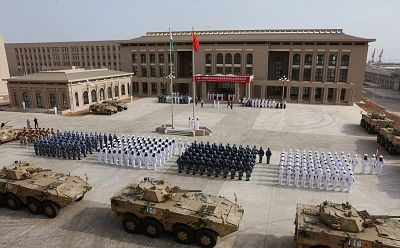Beijing has not denied reports it has installed cruise missiles in the South China Sea.
The United States has warned China that there will be "consequences" over its militarization of disputed islands in the South China Sea amid reports it has moved missiles there.
The threat comes as the two nations continue talks to resolve a major trade dispute, and follows a formal complaint to Beijing over lasers blinding U.S. pilots in the Horn of Africa.
White House spokeswoman Sarah Sanders told a news briefing Thursday that Washington was "well aware" of China's increased military presence in the South China Sea.
She was responding to a CNBC report that China has installed anti-ship cruise missiles and surface-to-air missile systems on three of the Spratly Islands — fortified outposts west of the Philippines.
"We've raised concerns directly with the Chinese about this and there will be near-term and long-term consequences," Sanders said.
Confirmation of the missiles could provoke renewed tensions in the area; they would be the first such weapons deployed in the Spratlys, over which Vietnam, the Philippines, Malaysia and Brunei also have rival claims to sovereignty.
China has not denied the reports. A foreign ministry spokeswoman told reporters Thursday that Beijing has "indisputable sovereignty" over the Spratlys and that "the deployment of necessary national defense facilities are meant to safeguard China's sovereignty and security."
"The relevant deployment targets no-one," the spokeswoman added.
China's militarization of the Spratlys has been a growing issue for nations around the South China Sea, a vital shipping channel that is also believed to have significant oil and natural gas deposits. In addition to land-reclamation, China has developed air bases, radar and communications systems on the islands. Its aircraft carrier, Liaoning, conducted drills with fighter jets in the area for the first time on Tuesday.
However, Beijing on Friday refuted a State Department complaint that a Chinese military base in Djibouti was responsible for lasers shone into the eyes of U.S. pilots landing nearby. The east African nation is used by American forces involved in the war on terror.
"Lasers pointed at aircraft have the potential to cause serious harm to the air crew and the surrounding area," the Pentagon said in a statement. "Two pilots in a C-130 suffered minor eye injuries."
A defense ministry spokesman said the Pentagon's complaint was "completely inconsistent with the facts."
"We have refuted the false accusations from the U.S. side through official channels," the spokesman said. "China has always strictly abided by international law … and is committed to maintaining regional security and stability."
Meanwhile, the Trump administration has asked China to reduce its trade deficit with the U.S. by $200 billion by the end of 2020, a U.S. official told the Associated Press Friday, as talks continued in Beijing to resolve a major trade dispute.
Treasury Secretary Steven Mnuchin sounded a positive note about the talks in a brief comment to reporters as he and other members of the U.S. delegation set off for more meetings with the Chinese. "We're having very good conversations," Mnuchin said.
Later, China's state news agency Xinhua said the two sides "reached consensus in some areas," but acknowledged "relatively big differences over some issues."














